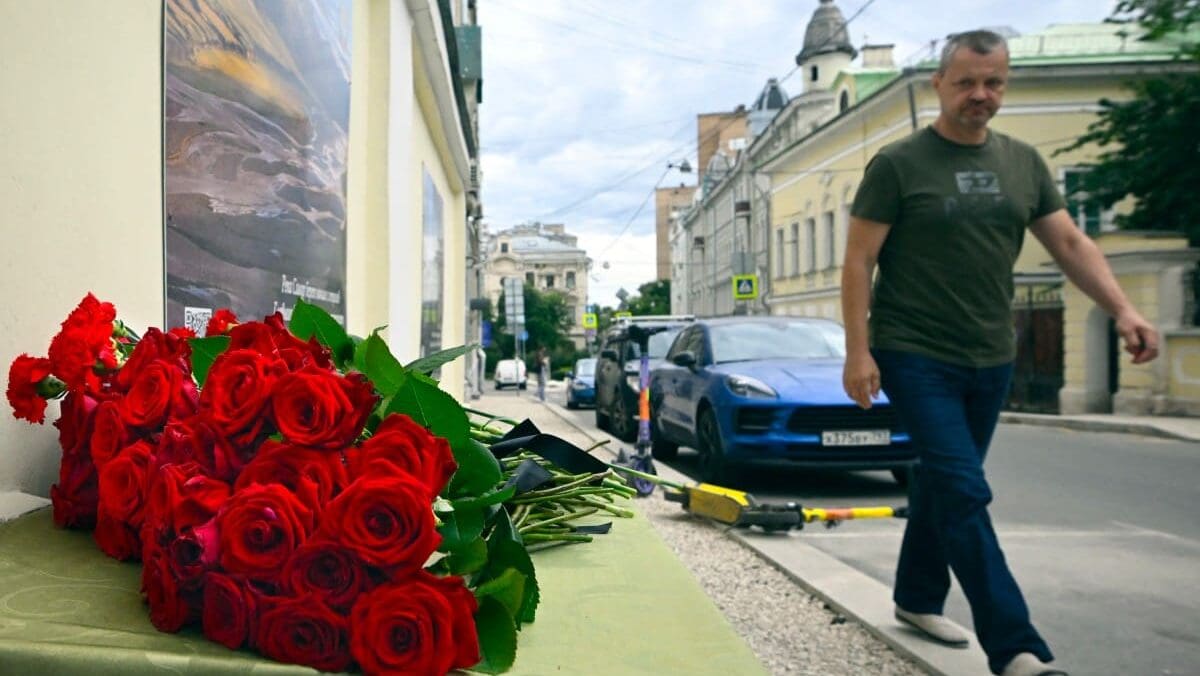
A man walks past the flowers laying in front of the representative office of Dagestan in Moscow on June 24th, 2024, following terrorist attacks in Dagestan.
Photo: ALEXANDER NEMENOV / AFP
Sunday’s terrorist attacks in Makhachkala and Derbent—the two largest cities of the southern Russian majority-Muslim republic of Dagestan—were the most severe experienced by the republic in 14 years. Gunmen left 15 policemen and four civilians dead, including one Orthodox priest whose throat was slit.
The Russian Federal Security Service’s anti-terrorist operation killed five of the attackers. The terrorists targeted religious sites, opening fire with automatic weapons in two Orthodox churches and a synagogue which is home to an ancient Jewish community. The gunmen also targeted a police station. Regional authorities have declared three days of mourning.
A subsequent investigation revealed that two of the suspected gunmen are the sons of the head of Dagestan’s Sergokala district, Magomed Omarov. Ironically, Omarov organized a local counter-terrorism meeting as recently as April. He has since been arrested, interrogated, and sacked.
Another attacker was formerly affiliated with a pro-Kremlin party. Taken together, this has prompted concern that the Dagestani political elite might have been infiltrated by Islamists.
According to Russian news agency TASS, security services are searching for accomplices, while authorities continue to look for foreign-trained sleeper cells.
While no one has yet claimed responsibility for the attacks, some experts say they have all the hallmarks of an Islamic State (IS) terror operation. The affiliate of the Islamic State group in Afghanistan that claimed responsibility for last March’s terror attacks in Moscow was quick to praise the Dagestan killings, which they attributed to “brothers in the Caucasus who showed that they are still strong.”
The Washington-based Institute for the Study of War argued that the Islamic State group’s North Caucasus branch, Vilayat Kavkaz, likely was behind the attack, describing it as “complex and coordinated.” Perhaps not coincidentally, the attacks took place on the same day that the Russian Orthodox Church celebrated Pentecost.
“We know who is behind these attacks and what purpose they are pursuing,” Dagistan’s governor, Sergei Melikov, said in a video message on Telegram, without clarifying who was involved. He did refer to the war in Ukraine, just as the Kremlin did after the attack on a concert hall in Moscow earlier this year, which killed 145.
Without providing evidence for his claim, Melikov said the attacks were “definitely prepared from abroad” and called the actions “an attempt to destabilize the region.”
By linking the attack to Moscow’s war in Ukraine—without saying it openly—the governor implicated Ukrainian or Western involvement.
The Russian Interior Ministry weighed its words more carefully, referring simply to “terrorist attacks.”
Dagestan, one of Russia’s poorest regions, borders Chechnya and is near Georgia and Azerbaijan. The republic, home to a majority Muslim population, faces the ever-present threat of radicalisation.
In the 1990s and around the year 2000, there were clashes in the region with radical Islamic groups that were operating from both Dagestan and neighboring Chechnya. Several such groups aimed to create an Islamic caliphate stretching across the whole of the Caucasus, but most of their leaders were liquidated at the time. Since then, the region has been relatively peaceful.
Since the Hamas terror attack on Israel last October, and Israel’s response in Gaza, there have been several antisemitic incidents in Dagestan. That same month, anti-Jewish protesters tried to storm an aircraft from Israel as it landed in the capital, Makhachkala.
In a clip posted to X, a young boy who had joined the mob was then asked why he was there, to which he replied he was there to kill Jews.
